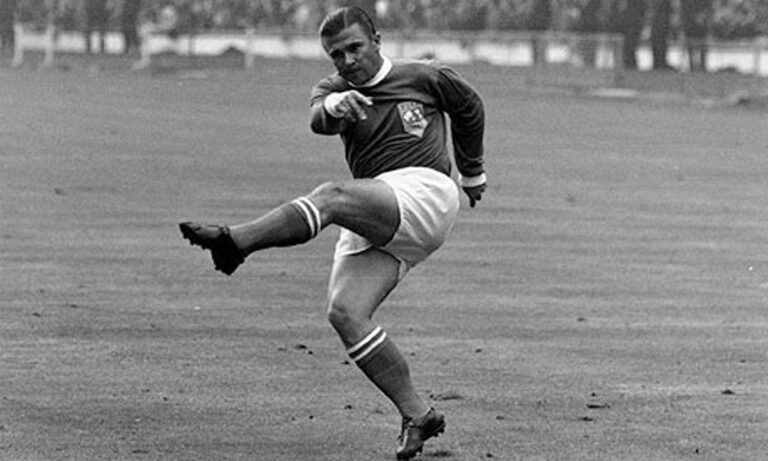Ferenc Puskás is one of the most iconic figures in the history of football. He was born on 1st April 1927 in Budapest, Hungary and he became a legend for his remarkable goal-scoring ability and field leadership. With his fantastic left foot, Puskás was vital in establishing Hungary´s Golden Team and he enjoyed a good club career with Real Madrid. We will discuss his career, match records, goals, major wins and personal life.
Early Life and Career
Puskás, who was born Ferenc Purczeld, was brought up in Kispest, a suburb of Budapest. He played for some teams and at a young age, his father — who was a football coach — introduced him to the sport. He joined Kispest AC, which later became Honvéd FC the Hungarian Army football team at 16. The prodigy syndrome by which he became an instantaneous national hero, eventually earning him a seat with the Hungarian national team in 1945.
Awards and Accomplishments — Key Successes
The player also lifted numerous titles and awards, especially at the club and international level. His success includes:
- 1 Olympic Gold Medal (1952) — Led Hungary to gold in Helsinki.
- Central European International Cup (1953) — ran rampant with Hungary in this competition.
- La Liga Titles (1958–1964) – Won 5 La Liga titles for the Spanish Giants Real Madrid.
- European Cups Won (1959, 1960, 1966) — One of the architects of Real Madrid’s European dominance
- Pichichi Trophy (1959, 1960, 1961, 1963, 1964) – Top scorer in La Liga for multiple seasons
Match Records
PLAYING CAREER: Breaking records was a consistent theme of Ferenc Puskás. More of his match stats are listed in detail below:
- Hungary National Team
- Caps: 85 appearances
Goals: 84 goals (which are some of the highest ratios in football history)
- Honvéd FC
- Caps: 349 appearances
- Goals: 358 goals
- Real Madrid
- Caps: 262 appearances
- Goals: 242 goals
Puskás was notorious for their immense goal-scoring ability, which he showcased in a number of unforgettable games.
Goals Table (International and Club)
| Team | Matches Played | Goals Scored |
|---|---|---|
| Hungary | 85 | 84 |
| Honvéd FC | 349 | 358 |
| Real Madrid | 262 | 242 |
Breaking News
Though Ferenc Puskás passed away in 2006, his legacy lives on. Recently, the Hungarian government has invested significantly in preserving his memory. The Ferenc Puskás Academy continues to train young talent, and Puskás’s name is frequently mentioned in discussions about football’s greatest players. In addition, the FIFA Puskás Award is presented each year to the player who scores the most beautiful goal of the season, further honoring his legacy.
Relationship and Family Life
Puskás had a family life as a rock and his wife, Erzsébet always remained at his side, united in their good and bad times. Puskás was married to her until his death. He also had a daughter, Anikó, with whom he was close. Although he was now in exile and living away from his beloved Hungary as a result of the 1956 uprising, Puskás was forced to dedicate his life to caring for his own.
Late Career and Exile
Puskás went into exile in 1956 following the Hungarian Uprising and was subsequently banned from playing football for 18 months. Few believed this was the end of his career. Nevertheless, he signed up in 1958 for a sensational return to Real Madrid. Higher weight in the latter stages of his career, Puskás was past his prime when he moved to Spain but demonstrated his outstanding talent with prolific input at the club level.
Net Worth & Financial Legacy
Ferenc Puskás — $1.5 million (at time of death 2006) His wealth came as a result of his career on the field, coaching jobs and business initiatives. Furthermore, his legacy has been appreciated more over the years and is now immortalized in stadiums across the globe — such as Puskás Arena — as well as prestigious football awards and academies.
Final Years and Legacy
Puskás’s later years were blighted by Alzheimer’s disease. After a distinguished but quiet retirement, he died on November 17, 2006, at the age of 79. At a state funeral in Hungary, his death attracted thousands of his countrymen who came out to pay their respects. And to this day the name of Puskás has become inexorably tied with football and is universally admired by players across the world.
For more visit sportsroaring.com
